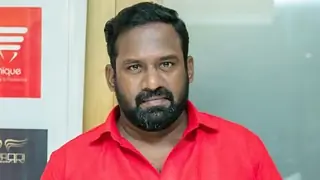Sachin Dev Burman (Respectedly called "Dada Burman") was born October 1, 1906 as one of the nine children of Prince Komilla of Tripura. His father Nabadwipchandra Dev Burman, was a sitarist and dhrupad singer as well as his first teacher too. Later his training continued with Ustad Badal Khan and Bhishmadev Chattopadhyay, and this classical training gave him a firm rooting for the music that he was to compose later in life.
He had explored the forests of Assam and Tripura from where he gained his formidable knowledge and rich repertoire of the folk of that region and Bengal.
Later he became a disciple of Ustad Aftabuddin Khan, becoming an ace flautist, He had started his own music school, 'Sur Mandir' in Calcutta in the 1930's. He rose to be a popular singer there. He joined the illustrious K. C. Dey in the Calcutta.
He started his musical career in Bengal as a singer of folk and light classical music and also composed music for the radio, which bore prominent traces of East Bengali and north-eastern folk music, music that had inspired him early in life.
His first Film debut singing was for Pankaj Mullick in Atorthy's Yahudi Ki Ladki (1933) but the songs were scrapped and re-sung by Pahadi Sanyal. Finally his first film as singer was Tinkari Chakraborthy's Sanjher Pidim (1935).
His film compositions are influenced by his huge repertory of folk-tunes from the Bengali Bhatiali, Sari and Dhamail traditions of the North East. As a singer, his thin but powerful, accented voice was often used as a bardic commentary.
Dada started work as a music director in Calcutta in 1939. In Calcutta he tried to to compose muisc for new theatre movies but he couldn't got opportunity, Five years later, he moved to Bombay. His first major breakthrough came the following year with the Filmistan's Do Bhai (1947) Aath Din(1948) and Sabnam (1949). Munimji was another hit.
Dada was disgusted with materialism and the sheer commercial nature of the Mumbai film industry. Volcanic in nature, Dada decided to quit mid–way through Mashaal (1950) and return to Calcutta.
Luckily he was persuaded by Dadamoni (Ashok Kumar) to stay on, though Manna Dey completed the assignment – and with Burman's 'Upar Gagan Vishal' (which established Manna Dey as a singer) from this film, Dada finally arrived.
Dada was himself a great singer and has sung many songs in Bengali which were released during the Puja season as well as in Hindi films. Though his singing was limited after he ventured in to composing music full time, his accented voice was used for tunes that required a folk-like rendition.
Dada Burman was very choosy in selecting films for scoring music. He never took too many assignments at a time. Likewise, he was very choosy in selecting the singers. It is said that he used to telephone to the singers early in the morning, study their voice indirectly while making conversation and then select.
Dada was also very fond of fishing and sports, especially foot ball and tennis. Though he wore only a dhoti and kurta, his creative outlook in music was very modern in the sense. that he used to blend Indian classical ragas with Western and make the tune most appealing in melody by his golden touch. He has used the flute very effectively in most of his compositions.
His career never flagged till 1974 when he quit signing films from ill–health. He is remembered even today, through his great compositions. This great composer attained his heavenly bliss on October 31, 1975.
Edited by Qwest - 18 years ago





























